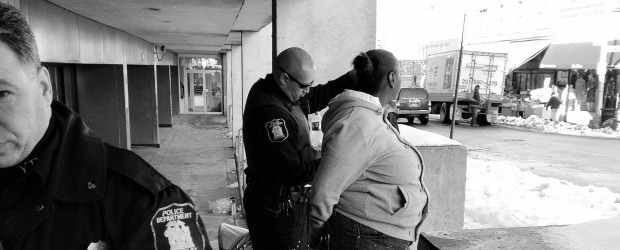You have no items in your cart. Want to get some nice things?
Go shopping
A young Caucasian woman walks into the shelter one afternoon and tells a staff member she needs help. She has mousy brown hair, blue eyes, and appears to be in her early thirties. Although it’s twenty degrees outside, her porcelain skin is covered by a black sweatshirt and blue sweatpants, dirty white sneakers. She says she was taken to the hospital last night without her house keys and needs to return home, but is unable to.
She says she can’t call her landlord because she doesn’t have the number. She can’t call any of her family or friends because she doesn’t know their numbers. Her speech is slow and shaky; her voice waivers. The woman appears to be in a hazy benzodiazepine daze, not too far from sedation.
Liars are common in the shelter. Some people only want money, says Alex, a staff member, and will try anything to get it: manipulate the mentally challenged, pretend they’re someone else.
The woman eventually says she spent the night in a hospital psychiatric ward after punching out all of her apartment windows. She says she’s bipolar but currently not on any medication because she doesn’t have a psychiatrist.
“She’s probably AWOL—went for a cigarette and kept walking,” says Alex. “Where’s her discharge papers? Her hospital bracelets? If she punched out windows, the hospital wouldn’t let her walk after just a day.”
A few minutes later, the woman gets a cup of water from a cooler and walks out of the facility, into the parking lot and toward Getty Square—the city’s downtown area.
***
The cafeteria at The Sharing Community isn’t crowded on Fridays–unless it’s a holiday or bad weather. On this particular Friday, many of the tables are empty. Tamika sits at a table by herself, in the corner. Another African-American woman sits at a table close by the entrance and feeds her son, who is about six. In total, at 1 p.m. there are only nine clients having lunch.
“He probably has congestion in his system or something,” she says to an older African-American woman sitting with her. They discuss doing taxes, claiming children who aren’t theirs for more money.
“You gotta prove that shit though,” says the older woman. “’Cause you’ll only get about 50 cents back if you don’t. They ain’t playing.” They both laugh. The small boy plays with a small racing car on top of the table.
A young Hispanic woman sits at an adjacent table and also feeds her small son. He is in a stroller crying, and appears to be slightly over a year old. She looks younger than twenty.
“I don’t know why everyone is complaining,” says a young Hispanic woman as she walks into the cafeteria. “It ain’t that cold out there.”
After she receives her lunch, she discusses her home like with two teenage Hispanic males. Apparently, she is in foster care.
“This bitch wakes me up at 8 in the morning Saturday to go food shopping,” she says. “And made me clean her house for $30. I ain’t never seen so much shit under someone’s bed.” She tells the two males she used the money to buy body wash and detergent to wash her clothes.
The young Hispanic woman has dark roots and brassy auburn hair. Her hair is slightly curly but mostly frizzy, tied back in a bun. She is wearing tight acid wash jeans and a black sweatshirt—her stomach slightly protrudes over her pants like the top of a muffin. Her name is Reina.
Her black eyeliner is smudged, like she’d been out dancing the night before and didn’t wash her face, which is littered with pockmarks. Reina lives in Yonkers and doesn’t have a job or children, but once worked as a housekeeper and a translator. She dropped out of school in the tenth grade and did a stint in a psych ward for bipolar and depression down in Manhattan’s Gracie Square.
Reina’s in foster care because her biological mother’s boyfriend tried to have sex with her. She then moved in with her boyfriend, but left after one of his family members tried to have sex with her, too.
“She’s getting me a new phone though,” Reina says about her foster mother. “It’s free. I got my new case and everything.” She appears to be excited.
***
Women come to the shelter all the time, says Priscilla Gonzalez. But staff can’t make people utilize any of the organization’s services–even if they have children in tow.
“Some of them are all over the place and really need guidance,” she says. “They don’t understand we really want to help their children. It’s the children who suffer.”
Priscilla is a case manager at the shelter. She is a petite Hispanic woman with long red hair and porcelain skin, in her early thirties. Her soft voice is calm and she has a friendly demeanor. A soothing aura exudes from her presence.
She says she understands how tough it can be for some clients to care for children on a budget: she’s also a mother herself.
Women–especially pregnant women–aren’t allowed downstairs in H.O.S.T.—the drop-in shelter. Legal reasons, safety issues. Anything can happen down in H.O.S.T. and a pregnant woman is a liability. They can only come in for lunch, referrals to other agencies or group programs. The Women’s Initiative, which Priscilla helps run, facilitates therapeutic counseling sessions: One-on-one appointments, couples therapy, programs in Spanish. Many of the women, she says, who utilize these services are undocumented and do not speak English.
“But it’s like a party. You invite ten and two show up.”
She says some women try to take advantage by mistaking kindness for weakness. She talks about a client who tends to visit her office without an appointment, always looking for help.
“She asks for the smallest things—to make phone calls for her, read her paperwork,” Priscilla says. “She even asked me to help her with her divorce. I’m not a lawyer.”
“But you want to help everyone, you really do. And some women just don’t want your help,” she continues. “You gotta have a soft heart and thick skin.”


About Rachel McCain
Rachel McCain is an MFA candidate at Sarah Lawrence College in Bronxville, New York. She has written for The Source Magazine and previously served as deputy editor of Home Town Media Group, a small community newspaper company in New York. Currently, Rachel working on a nonfiction book manuscript. For more information, visit Rachelmccain.net.

